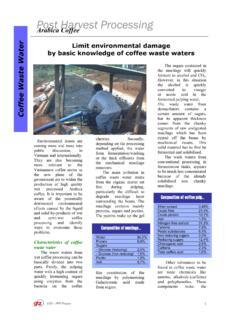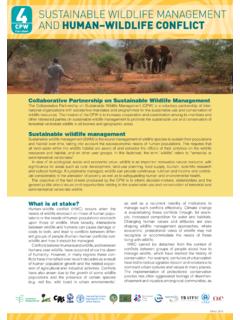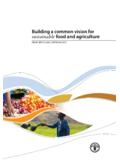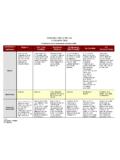Transcription of Principles & Practices for Sustainable Water …
1 Principles & Practices for Sustainable Water management in Agriculture At a farm level SAI Platform Water Working Group i This document has been produced for information purposes. It represents a collection of information that is freely available on the internet, and that we believe to be accurate. Nevertheless, it is by no means an exhaustive document and no guarantee is provided about the content. The views expressed herein do not reflect the official opinion of SAI platform, nor its members. Principles and Practices for Sustainable Water management in Farming Production (version 2010).
2 Water is a vital component of agricultural production. It is essential to maximise both yield and quality. Water has to be applied in the right amounts at the right time in order to achieve the right crop result. At the same time, the application of Water should avoid waste of a valuable resource and be in sympathy with the environment as a whole. Understanding, measuring and assessing how Water flows around the farm, and recognising how farming Practices affect flows, will help farmers to manage Water efficiently and reduce pollution risks. Economic, environmental and social considerations are playing an increasing role in agricultural production.
3 Careful and effective Water management will form part of these considerations, as well as helping the farmer to continue producing profitable production. Farmers aim to guarantee that the safety and quality of the Water which they use will satisfy the highest expectations of the food industry and consumers. In addition, on-farm Practices should ensure that Water management is produced under Sustainable economic, social, environmental conditions. To that aim, this document provides a set of Principles and Practices for Sustainable Water management for the mainstream market in all regions of the world and some crop specific ones.
4 It is meant to be revised regularly on the basis of practical experience. Furthermore, it is meant to be completed with specific guidelines and practical tools based on local innovations and adapted to local prevailing conditions (according to the region and its climates, ecological variables, farming systems, cultures etc) as well as respecting national laws and regulations. This document on Water management in agriculture at farm level aims to address the key aspects of Water and irrigation management at an environmental, economic and social level. Emphasis is given to correct management of Water , both in terms of quantity and quality.
5 The Basic framework looks as follows: Principles & Practices for the Sustainable Water management - Version 2010 2/16. 1. Item. An item refers to an object of management . 2. Principles identify the objective(s) of what should be accomplished with regard to an item. 3. Recommended Practices provide a set of identified non-exclusive tools and measures that can be implemented to achieve the objective(s) of a principle. It is important to note that good management of a farming system constitutes the grassroots of the system's economic, environmental and social sustainability.
6 Therefore, it first pays attention to planning and managing well the overall farm system itself. This document's scope of management action is limited to what farmers or groups of farmers themselves can achieve. Farmers shall have taken into consideration applying the Principles and Practices to the whole farm system within a philosophy of continuous improvement. The following headings and bullets summarise the sections and objectives when applied to a whole farm system. Sections of the document contain greater detail on specific Practices . Some sections are linked to the technical briefs to provide further information on particular topics.
7 Click on the underlined words to follow the links. The report is structured as follow: Sustainable Farming Systems (chapter 1). Agriculture is considered to be a significant contributor of Water pollution by nonpoint1 sources. Diffuse pollution can arise from a range of activities on the farm, such as the leaching of fertilisers or soil erosion, which are spread out over a wide area and therefore harder to pinpoint and control. Many of the substances used in agriculture can cause Water pollution (fertilisers, pesticides, manure and slurry, even the soil itself).
8 Are essential elements of farming. This section provides recommended farming Practices for tackling diffuse Water pollution. Sustainable Farming System as a whole farm approach provides a framework for implementing the list of suggestions. It covers farm selection and management , integrated crop and pesticide management , soil protection and yards. Economic sustainability (chapter 2). A good management of Water resources will help farmers to cut costs while maintaining or improving the productivity of the land and reduce the risk of pollution. This section provides some Practices to ensure safety, quality and transparency, financial stability, accountability, innovation and risk management from an economic perspective.
9 1. Contamination arising from land use activities that is dispersed across a catchment or sub-catchment Principles & Practices for the Sustainable Water management - Version 2010 3/16. Social Sustainability (chapter 3). Achieving success in Water conservation requires various levels of engagement and collaboration throughout the entire food sector and its stakeholders. Throughout this collaboration, it appears that several solutions exist to improve the Water use at the farm level, including good Practices . From a social perspective this section focuses on working conditions, capacity building and community engagement and recommends some Practices to ensure an adequate Water management at a farm level.
10 Environmental sustainability (chapter 4). Wise stewardship of Water resources can help ensure to diminish the effect on agriculture Practices on quality and availability of Water resources. This section draws together various aspects of environmental Water sustainability looking at irrigation, leaks, pesticides management , Water quality, Water conservation Practices and the establishing a comprehensive Water management at a farm level. The recommended Practices presented in this section aim delivering real benefits for farmers and the environment and at the same time minimising the effects on the environment.














